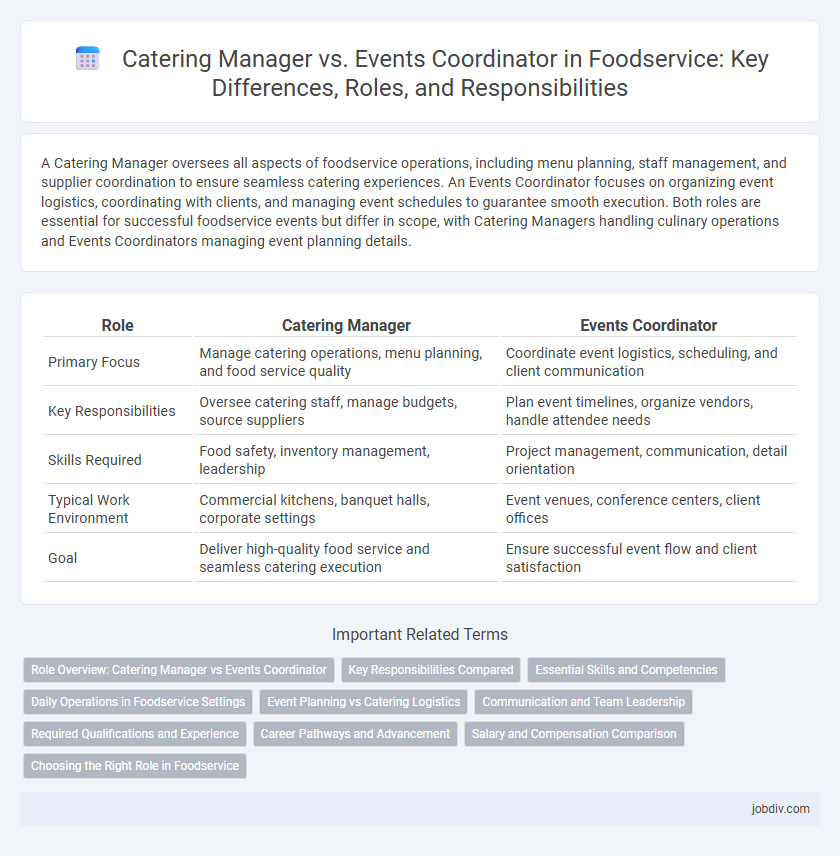A Catering Manager oversees all aspects of foodservice operations, including menu planning, staff management, and supplier coordination to ensure seamless catering experiences. An Events Coordinator focuses on organizing event logistics, coordinating with clients, and managing event schedules to guarantee smooth execution. Both roles are essential for successful foodservice events but differ in scope, with Catering Managers handling culinary operations and Events Coordinators managing event planning details.
Table of Comparison
| Role | Catering Manager | Events Coordinator |
|---|---|---|
| Primary Focus | Manage catering operations, menu planning, and food service quality | Coordinate event logistics, scheduling, and client communication |
| Key Responsibilities | Oversee catering staff, manage budgets, source suppliers | Plan event timelines, organize vendors, handle attendee needs |
| Skills Required | Food safety, inventory management, leadership | Project management, communication, detail orientation |
| Typical Work Environment | Commercial kitchens, banquet halls, corporate settings | Event venues, conference centers, client offices |
| Goal | Deliver high-quality food service and seamless catering execution | Ensure successful event flow and client satisfaction |
Role Overview: Catering Manager vs Events Coordinator
A Catering Manager oversees foodservice operations, managing staff, budgets, and vendor relationships to ensure seamless catering delivery. An Events Coordinator plans and executes event logistics, coordinating client needs, venues, and schedules for successful event experiences. While both roles collaborate closely, the Catering Manager focuses on culinary and service execution, whereas the Events Coordinator handles overall event planning and coordination.
Key Responsibilities Compared
Catering Managers oversee menu planning, vendor negotiations, and staffing to ensure seamless foodservice operations for events. Events Coordinators focus on client liaison, event logistics, and schedule management to execute precise event flow and guest experience. Both roles collaborate to deliver successful catered events, with Catering Managers emphasizing food quality and Events Coordinators prioritizing event coordination.
Essential Skills and Competencies
A Catering Manager excels in strategic planning, budget management, and client relations, ensuring seamless foodservice operations for large-scale events. An Events Coordinator demonstrates strong organizational skills, multitasking abilities, and vendor communication to coordinate event logistics and customer experience. Both roles require leadership, problem-solving, and attention to detail to deliver successful catered events.
Daily Operations in Foodservice Settings
A Catering Manager oversees daily foodservice operations by managing staff schedules, coordinating with kitchen teams, and ensuring timely delivery of catering orders to meet client expectations. An Events Coordinator focuses on planning and executing event logistics, including venue setup, client communication, and vendor management, while supporting foodservice requirements. Both roles require strong organizational skills, but the Catering Manager emphasizes operational efficiency in food preparation and service, whereas the Events Coordinator prioritizes event flow and client satisfaction.
Event Planning vs Catering Logistics
A Catering Manager specializes in catering logistics, managing food preparation, staffing, inventory, and on-site service to ensure seamless dining experiences during events. An Events Coordinator focuses on event planning, organizing venue selection, guest management, scheduling, and overall event design to create cohesive and memorable occasions. Both roles require collaboration but prioritize different operational aspects to successfully execute foodservice events.
Communication and Team Leadership
Catering Managers excel in strategic communication, coordinating between clients, kitchen staff, and service teams to ensure seamless event execution. They demonstrate strong team leadership by managing diverse departments, overseeing logistics, and motivating staff to meet high-quality foodservice standards. Events Coordinators focus on detailed client interaction and collaborative teamwork, facilitating real-time problem-solving and ensuring all event elements align with customer expectations.
Required Qualifications and Experience
Catering Managers typically require a bachelor's degree in hospitality management or culinary arts and 3-5 years of experience overseeing large-scale foodservice operations. Events Coordinators often hold a degree in event planning, communications, or hospitality, with 1-3 years of experience managing logistics and client relations for various event types. Both roles demand strong organizational skills, but Catering Managers need deeper expertise in food safety regulations and vendor management, while Events Coordinators focus more on scheduling, budgeting, and coordination.
Career Pathways and Advancement
Catering Managers typically advance by gaining expertise in large-scale event operations, managing client relationships, and overseeing food service teams, often progressing to senior management or hospitality director roles. Events Coordinators focus on planning and executing diverse events, developing skills in vendor negotiation and logistics, enabling career growth into senior event management or conference planning positions. Both roles require strong organizational skills, but Catering Managers usually emphasize foodservice knowledge, while Events Coordinators prioritize event design and client engagement for career advancement.
Salary and Compensation Comparison
Catering Managers typically earn a higher salary than Events Coordinators, with average annual compensation ranging from $50,000 to $75,000, reflecting their responsibility for overseeing foodservice operations and managing staff. Events Coordinators generally receive salaries between $40,000 and $60,000, focusing on event planning and logistics rather than direct foodservice management. Benefits for Catering Managers often include performance bonuses and profit-sharing options, contributing to a more substantial overall compensation package compared to the usually fixed salary and limited bonuses for Events Coordinators.
Choosing the Right Role in Foodservice
Choosing between a Catering Manager and an Events Coordinator depends on your career goals within foodservice operations. A Catering Manager focuses on overseeing menu planning, budgeting, and kitchen staff coordination to deliver exceptional dining experiences. In contrast, an Events Coordinator prioritizes logistics, vendor management, and client communication to ensure seamless event execution and customer satisfaction.
Catering Manager vs Events Coordinator Infographic

 jobdiv.com
jobdiv.com